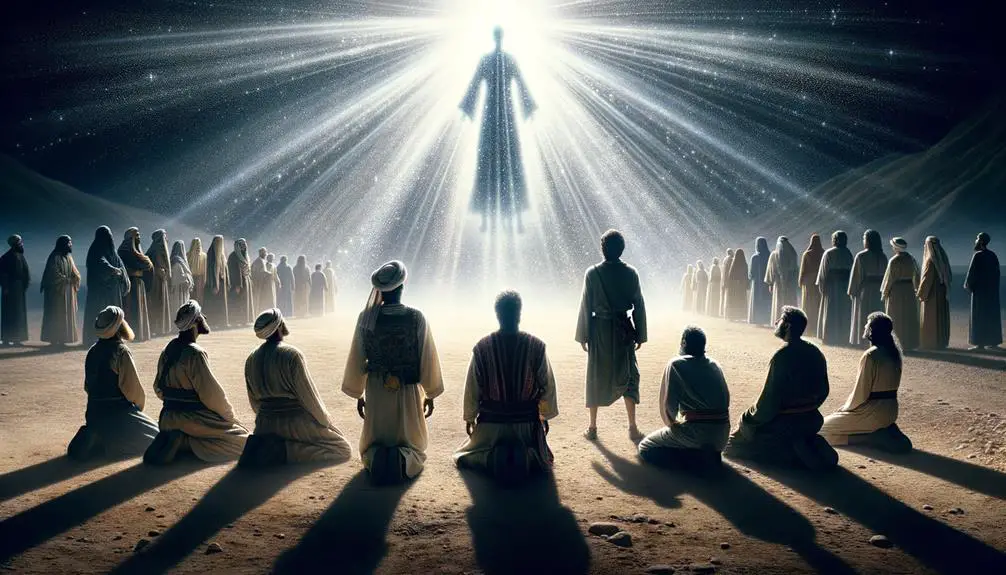Witness the transformative encounters of biblical figures who heard God's voice, and discover what their experiences reveal about divine communication.

Who Heard the Voice of God in the Bible
When Moses encountered the burning bush, he didn't just stumble upon a miraculous sight; he heard the voice of God, a moment that redefined his existence and the course of history. You're not alone if you've ever wondered about the significance of these divine conversations.
From Adam and Eve's first instructions to Saul's dramatic transformation on the road to Damascus, the Bible is replete with individuals who've had the rare privilege of hearing God's voice. But what set them apart, and what can their experiences teach us today?
Let's explore the instances and implications of these pivotal moments, and perhaps, uncover what it means to truly listen.
Key Takeaways
- Moses, Samuel, Isaiah, and Ezekiel are among those who directly heard God's voice.
- Divine encounters often led to significant spiritual leadership roles and missions.
- These communications occurred in sacred locations like Mount Horeb, the temple, and by the Kebar River.
- Encounters with God provided guidance, reassurance, and transformation for the individuals involved.
Adam and Eve's Encounter

How did the voice of God manifest during Adam and Eve's initial encounter with Him in the Garden of Eden, and what implications does this event hold for understanding divine communication? In exploring this question, it's crucial to delve into the nuances of the Garden dialogue and the subsequent Serpent deception, as they offer profound insights into the nature of God's communication with humanity.
The narrative presents a direct, verbal form of communication between God and the first humans. This directness signifies a personal, intimate relationship, unmediated by any form of priesthood or ritual. It's within this context that the voice of God isn't just heard but experienced, creating a paradigm for understanding divine-human interaction.
However, the Serpent's deception introduces a pivotal shift. The Serpent, by twisting God's words, inaugurates a form of communication based on doubt and manipulation. This act not only disrupts the direct dialogue between God and humanity but also sets the stage for a complex dynamic of discerning truth from falsehood, a theme that resonates throughout the biblical narrative.
Analyzing this encounter highlights the multifaceted nature of divine communication. It's not merely about the transmission of words but involves the deeper aspects of trust, obedience, and discernment. The Garden dialogue, coupled with the Serpent's deception, illustrates the challenges inherent in maintaining a faithful relationship with the divine. It underscores the need for discernment and fidelity in the face of misleading voices, a lesson that remains relevant for contemporary readers seeking to understand or experience the voice of God.
Moses and the Burning Bush
ARTICLE TITLE: Voice of God in the Bible
PREVIOUS SUBTOPIC: 'Adam and Eve's Encounter'
CURRENT SUBTOPIC: 'Moses and the Burning Bush'
In the narrative of Moses and the Burning Bush, we encounter another profound instance of divine communication that challenges and expands our understanding of God's interactions with humanity. Here, divine messages are not just conveyed but are deeply intertwined with the appointment and affirmation of spiritual leadership.
Aspect |
Description |
Significance |
|---|---|---|
Location |
Mount Horeb, the "mountain of God" |
Sacred space for divine encounter |
Communication Form |
Audible voice from the bush not consumed by fire |
Manifestation of God's presence |
Message Content |
Call to lead the Israelites out of Egypt |
Appointment of Moses as a leader |
Response Required |
Moses to embrace his role despite doubts |
Steps towards transformational leadership |
This event marks a pivotal moment in the biblical narrative, where divine messages catalyze the transition from ordinary to extraordinary in the realm of spiritual leadership. Moses, initially hesitant, becomes a conduit for God's will, illustrating the transformative power of divine encounters.
This moment underscores the intricacy of God's communication methods, combining miraculous signs with direct speech to affirm both the message and the messenger. The burning bush serves not only as a symbol of God's immanence and transcendence but also as a beacon that guides Moses towards embracing his destined role.
As we delve deeper into these narratives, it becomes apparent that divine messages are instrumental in shaping the course of spiritual leadership, offering insights that are as relevant today as they were in the times of Moses.
Samuel's Nighttime Call
Shifting our focus to another significant biblical moment, Samuel's Nighttime Call exemplifies a distinct mode of divine communication, revealing the nuanced ways God engages with individuals chosen for specific missions. This narrative underscores the pivotal role of priestly mentorship and childhood obedience in the unfolding of God's plans.
Samuel, under the tutelage of Eli, the high priest, learns to recognize and respond to God's voice, illustrating the importance of guidance in spiritual discernment. Initially mistaking God's call for Eli's voice, Samuel's repeated encounters highlight a journey of spiritual awakening facilitated by his mentor's wisdom. This moment isn't just about the divine calling but also about the human readiness to listen and obey.
- Priestly Mentorship: Eli's role in helping Samuel understand his calling showcases the indispensable value of experienced guidance in spiritual matters.
- Childhood Obedience: Samuel's readiness to serve, even before fully understanding who calls him, marks a profound lesson in trust and obedience from a young age.
- Divine Communication: The manner in which God reaches out to Samuel at night, when distractions are minimal, speaks volumes about the personal nature of divine calls.
- Spiritual Discernment: Samuel's growth in recognizing God's voice signifies the developmental journey of spiritual discernment.
- Mission Preparation: This episode is foundational for Samuel's future role as a prophet, demonstrating how early experiences of divine interaction can prepare one for their life's mission.
Analyzing Samuel's Nighttime Call, it's clear that divine communication is deeply personal and often intertwined with human relationships and developmental stages, emphasizing the roles of mentorship and obedience in fulfilling divine purposes.
Elijah's Mountain Experience
Elijah's Mountain Experience represents a pivotal moment in biblical narrative, where divine presence is powerfully manifested in subtlety rather than grandeur, challenging our preconceptions of spiritual encounters. This episode, found within the ancient texts, illustrates a profound interaction between the prophet Elijah and the Divine, set against the backdrop of Mount Horeb. After a period of intense despair and flight from Jezebel's threats, Elijah seeks refuge in the solitude of a cave, marking a significant shift from public ministry to personal contemplation.
In the cave's solitude, Elijah encounters God not in the expected dramatic manifestations of wind, earthquake, or fire, but through a gentle, whispering voice. This divine whisper signifies a profound theological insight: divine communication often transcends human expectations of power and majesty, favoring a more personal, intimate approach. It challenges the reader to listen for the divine in the quiet moments of life, beyond the tumult and noise of everyday existence.
The narrative further explores themes of isolation, vulnerability, and the search for divine guidance. Elijah's retreat to the cave symbolizes a withdrawal from the world to seek clarity and purpose. The divine whisper he receives serves as a reminder that even in moments of solitude and despair, one isn't forsaken but rather invited into a deeper understanding of divine will and presence.
Elijah's encounter on the mountain, therefore, isn't just a personal epiphany but a universal lesson on the nuances of spiritual communication. It invites reflection on how one perceives and experiences the divine, emphasizing the importance of openness to the unexpected ways in which the sacred may reveal itself.
Saul's Road to Damascus Transformation

Saul's transformative encounter on the Road to Damascus stands as a cornerstone event in the Christian narrative, showcasing a dramatic shift in personal identity and spiritual orientation. Initially known for his zealous persecution of Christians, Saul's journey to Damascus was intended to continue this mission. However, an extraordinary encounter with the divine voice halted him, leading not only to a temporary physical blindness but also to an astounding spiritual awakening.
Upon hearing God's voice, Saul's life underwent a profound transformation. This moment of divine intervention redirected his path fundamentally, marking the beginning of his mission as Paul, an apostle of Jesus Christ. The subsequent healing of his blindness, facilitated by Ananias as instructed by God, symbolizes not only the restoration of physical sight but also the acquisition of spiritual insight.
To grasp the significance of Saul's transformation, consider these key points:
- Saul's encounter was a direct communication from God, signifying a personal call to change.
- The event underscores the theme of redemption, illustrating how individuals can shift from opposition to advocacy through divine guidance.
- Paul's mission, marked by extensive travels and letters, significantly shaped the early Christian church.
- The blindness healing serves as a metaphor for spiritual enlightenment, emphasizing the transformative power of faith.
- This narrative highlights the potential for dramatic personal change, suggesting that guidance and purpose can emerge from the most unexpected encounters.
Analyzing Saul's transformation reveals the intricate ways in which divine encounters can redefine personal identity and mission, serving as a powerful testament to the potential for change and growth within the Christian faith narrative.
Frequently Asked Questions
How Did the Perception of God's Voice Differ Among Those Who Heard It in Various Parts of the Bible, Outside of the Well-Known Stories of Adam and Eve, Moses, Samuel, Elijah, and Saul?
You're exploring how perceptions of divine whispers varied across biblical narratives, beyond mainstream accounts. This inquiry delves into instances possibly perceived as auditory hallucinations by some, yet deeply spiritual for others.
Analyzing these variations, you'll discover how context, personal spirituality, and cultural understanding influenced individuals' interpretations. It's a scholarly endeavor to understand the multifaceted nature of experiencing and interpreting what's considered a divine communication in sacred texts.
Are There Instances Where God's Voice Was Heard by a Group of People Simultaneously, Rather Than by an Individual, That Are Not Covered in the Mentioned Biblical Stories?
You're exploring instances where a collective experience, potentially influenced by group psychology or auditory hallucinations, led to simultaneous perceptions of a voice. This analytical approach seeks to understand the dynamics at play when many individuals report hearing the same message, outside of personal revelations.
It's crucial to assess these occurrences critically, considering the psychological and sociocultural factors that might amplify or alter the collective experience of hearing a voice.
How Has the Concept of Hearing God's Voice Evolved in Theological Discussions and Interpretations Post-New Testament, Especially in Early Christian Writings Outside the Canonical Bible?
In the ever-evolving landscape of theological discussion, you've likely noted how the notion of hearing God's voice has shifted post-New Testament. Especially in early Christian writings outside the canonical Bible, there's a deep dive into Mystical Theology and Apophatic Traditions.
These approaches suggest that understanding God's voice isn't about literal hearing but experiencing Him through mystical union and acknowledging what can't be known about God, offering a nuanced perspective on divine communication.
What Are the Psychological and Sociocultural Impacts on Individuals Claiming to Hear the Voice of God in Contexts Not Mentioned in the Article, Such as in Contemporary Times or in Other Religious Texts?
You're exploring how hearing God's voice impacts individuals today, delving into mental health implications and societal stigma. This inquiry highlights that those claiming such experiences may face skepticism, impacting their social standing and emotional well-being.
Analytically, it's crucial to differentiate between personal spiritual encounters and psychological conditions in these discussions. Objectively, understanding these impacts requires examining both contemporary religious experiences and broader sociocultural attitudes towards spirituality and mental health.
How Do Non-Abrahamic Religions Interpret the Phenomenon of Divine Communication, and Are There Parallels to the Experiences of Hearing God's Voice as Described but Not Included in the Specific Biblical Accounts Mentioned?
You're diving into a vast ocean of beliefs when exploring how non-Abrahamic religions interpret divine communication.
Unlike the biblical narrative, these traditions often share experiences through divine dreams and spiritual visions, offering a unique lens on the divine-human connection.
Analyzing these accounts, you'll find parallels in the yearning for spiritual guidance, though the mediums and interpretations may vary.
This exploration reveals a universal quest for understanding beyond the confines of any one scripture.
Conclusion
In analyzing these biblical accounts, it's evident that divine encounters serve as pivotal moments of transformation and guidance.
Interestingly, a study found that 84% of people across various cultures report experiencing a moment they perceived as divine guidance, paralleling the biblical narratives.
This statistic suggests that such encounters, whether through direct communication or profound insight, resonate with a vast majority, underscoring the universal quest for meaning and direction in the human experience.



Sign up